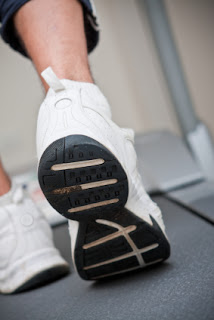While traveling I often head to the hotel fitness room to run a mile on a treadmill when I have a chance. It feels good to be up and active a bit to counter all the sitting travel requires.
Recently I learned a lesson about setting pace, though, that hadn’t sunk in before.
When I got on the mill and punched in 5.0 mph for the pace, I noticed the readout said it would take me 12 minutes to run my mile. Typical…. But this time I thought, “Oh that’s way too long. I don’t have that much time. I need to run faster and get this mile done quicker. So I punched in 6.0 mph. A ”10 minute mile,” now the digital display recorded. “Okay. Perfect. 10 minutes. I can do that,” I said to myself.
Part way through my mile, though, I started to wear out quickly.
“Oh man,” I complained, “I’m not going to finish this mile. I’m getting pooped!”
As the seconds wore on, my steps got less and less firm. I wasn’t going to make it, I started to fear. “Be tough,” the inner voice bellowed. I hung tough and finished, but resolved not to set that fast a pace again!
The next evening, I stepped onto the mill and punched in 5.0 mph. “My pace,” I affirmed, and I started my jog.
It was fun this time! It was a rate I could keep up with and not get myself so exhausted I risked not making it to my goal.
And I learned a valuable spiritual lesson for life.
If you want to succeed, run at a pace you can follow through with.
For instance, some people spend more than they earn. They’ve set a spending pace they can’t keep up with. Some set unreasonable New Year goals, jump in with an adrenaline-juiced determination, but soon falter. They couldn’t maintain the pace. Others push partners in relationships into places they aren’t ready to go. The effect might last a while, but relations soon fall apart because the pace didn’t have the necessary moral and spiritual foundation to sustain it. And so on…
Pace is a relative term, a human measurement, I suppose. But there’s a lot of wisdom in setting a pace your understanding and ability to demonstrate can sustain.


Really not where I thought you were going with this. Some of the concluding points – not spending at a more rapid pace than one is earning, for example – are fine, but the reasoning surrounding it is a bit iffy, to me.
It seems to me that the fact that you faced the resistance to the demand to go somewhat faster in your run was a victory; that your next run, of course, was a breeze, because your rising to the tougher challenge helped you break through limitation, and your old pace no longer could define you.
I don’t think you meant to leave the impression that easy equals good and harder equals bad, but it does come across that way. I was hoping and expecting that there would be some guidance, for example, on how to achieve worthy, progressive goals (sticking with New Year’s resolutions, for example), instead of just bagging aspirations to do better and simply settle for “my pace”.
Mrs. Eddy said, “In the figurative transmission from the divine thought to the human, diligence, promptness, and perseverance are likened to “the cattle upon a thousand hills.” They carry the baggage of stern resolve, and
keep pace with highest purpose.” S&H 514
It seems to me that when highest purpose sets the pace, we drop the limited “my” for the divine “Thy”, and discover that old limits drop away completely.
I do love reading your blogs. I will be back looking for more good.
I liked this a lot, Evan. It seems to me it fits with what Jesus said, about counting the cost before you begin to build, so that you can finish. Or Paul, who talks about finishing the race set before us.
I often work with the idea that God sets the pace.
Where could I find where Jesus talks about the cost before we begin to build and where Paul talks about finishing the race before us in the Bible? Thank you for your help.
To Anonymous” #3: the passage about the tower is in Luke 14:28.
Evan, I can see your point, but maybe it could also be argued that the lower your expectations, the less you’ll get in terms of results.
When selling a house, for example, it’s savy to ask for more than you can realistically hope for, because that way you’ll get a better price than if you go into it asking for the lowest market price. Same thing with healing–you go into it with highest expectations of healing, not saying, well maybe I’ll get half healed, or a bit healed.
Winston Churchill put it this way: “Everybody knew it was impossible. Then one day a man came along who didn’t know it. And he did it.”
“Find your pace” ~ In response to the first Commenter, my thought was, Each of us
finding our path, and the pace we walk on it,
through God’s unfoldment of good in our
(human) lives.
I used to not be able to hear God’s plan for my path,
and my pace, very well (still workin’ on this!), so I
sometimes, I admit, copied others that I admired.
This can be…problematic! I was not always ready
to do what they were doing, so ran into probs.
It is always best to listen to God, and to run at His
Pace, trying, like St. Paul, to “run with patience the race set before us.”
Isn’t it just great that each moment is full of fresh opportunities from our infinite Source, divine Love?!!
I love the above comment about “finding His pace.” Perfect answer to all above!